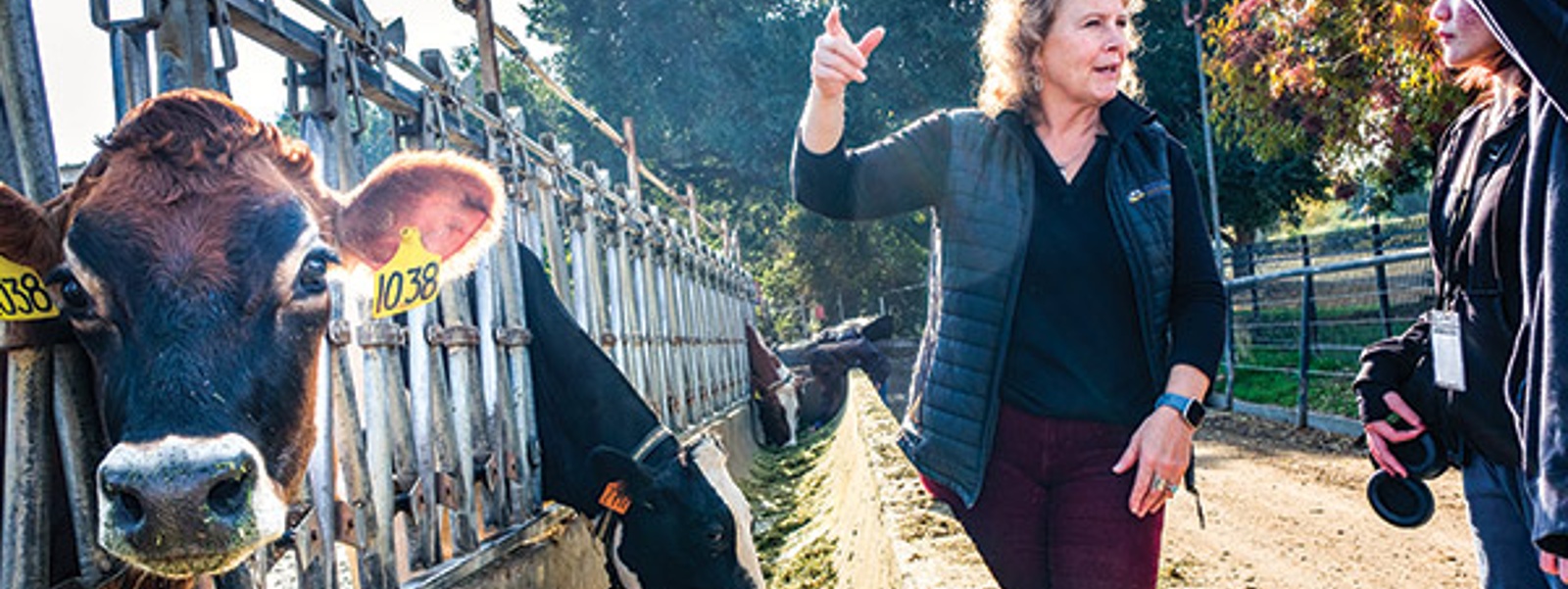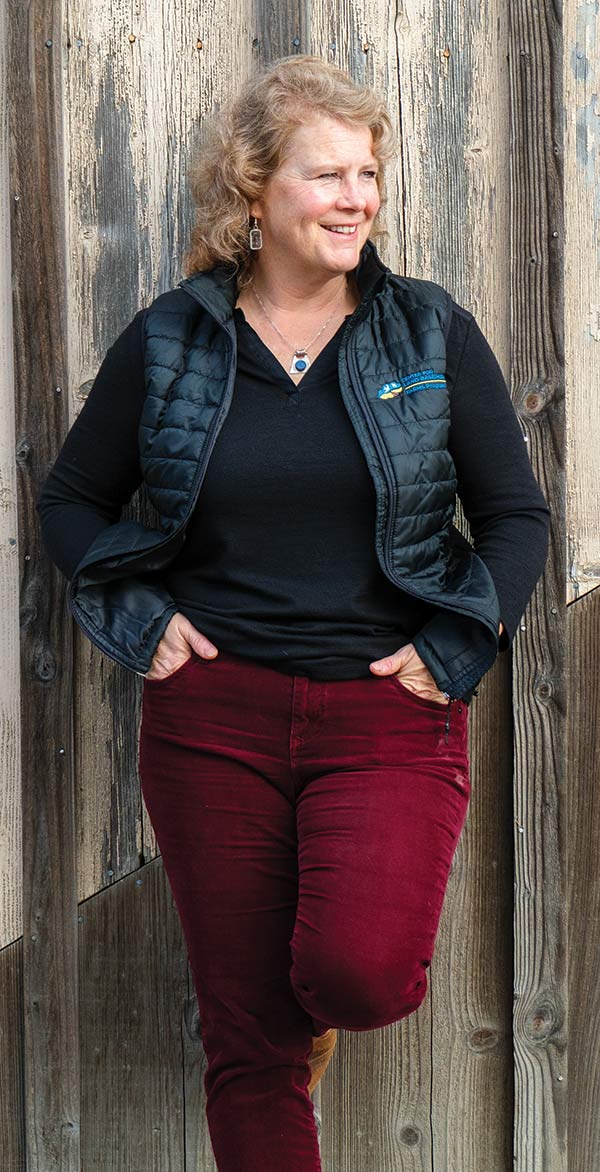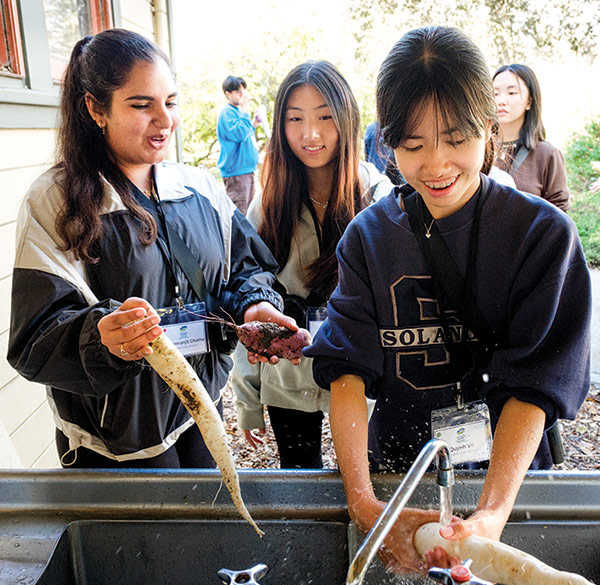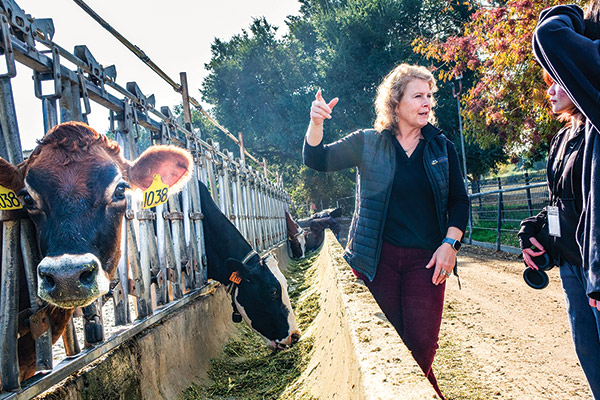It's a bountiful life: Cultivating new farmers

Spring 2024 California Bountiful magazine

Director leads nonprofit that trains future ag professionals
Interview by Linda DuBois
Photos by Steve German
New generations will continue to grow food in California thanks in part to the Center for Land-Based Learning, a Yolo County nonprofit that works to develop new farmers, agricultural leaders and natural resource stewards.
In 1993, walnut farmers Craig and Julie McNamara started a program for 30 high school students to give them hands-on training in farming on a 5-acre site in Winters. Then called the FARMS Leadership Program, it was run by volunteers who worked with a couple of other established organizations. Then in 1998, the center hired its first employee, Mary Kimball, who went on to become the chief executive officer.
Under her leadership, the center has grown into several youth and adult programs in more than 25 California counties, with 20,000 alumni, 30 employees and 75 to 100 volunteers. After outgrowing the original 1,500-square-foot farmhouse office, the headquarters moved into a 6,000-square-foot building on more than 30 acres in Woodland in 2020.
Adult programs train beginning farmers to grow and sell produce, provide land to get them started, offer farm-management apprenticeships and more.
The center has earned numerous regional, state and national awards and in the spring of 2023, Kimball was named Yolo County Woman of the Year.

What first drew you to your job?
I started part-time when it was a very different job—basically to take a little fledgling high school education program to different places in the state. What drew me is I’ve always loved agricultural education. I was raised in 4-H and FFA, and those were incredibly important programs to me growing up.
I have my master’s degree in agricultural education from Ohio State University, and my undergrad is from UC Davis in plant science and ag business.
I was intrigued by the hands-on program model that brought out high school students from different schools and different backgrounds over a school year, multiple times, to learn about farming, resource management and leadership skills. And I loved that it focused on sustainability. In that era, it was a very innovative program.
Tell us how the youth programs have grown.
The original FARMS (Farming, Agriculture, and Resource Management for Sustainability) was a one-year program when I started. Now, they have the option of a second-year advanced program and then a paid internship.
In 2001, we became an official nonprofit and created SLEWS (Student and Landowner Education and Watershed Stewardship) where students work on habitat restoration. Now, it’s a model that we teach other organizations. We started Caring for Our Watersheds around 2009. It has students research their local watershed and come up with solutions for environmental problems.
Tell us more about the farmer training for adults.
The California Farm Academy Beginning Farmer Training is a seven-month program where students learn to grow, market and sell their products. There are lectures by agricultural professionals, field experience and farm visits. One of the really cool things is it includes instruction on writing a business plan. Even if you grew up on a farm or studied crop science in college, you’re not necessarily going to learn how to do a business plan.
The Explorer Course teaches what it takes to start and manage an agricultural business and helps students decide whether this is a path they want to take.
The Farm Business Incubator program gives beginning farmers access to land, infrastructure and ongoing training for up to four years to help get their businesses going. The locations are Maples Farm at our headquarters in Woodland and several West Sacramento urban farms.
The two-year apprenticeship program trains people for farm-management jobs by connecting them with mentors and giving them practical experience.
The Farm and Climate Program is our newest program, begun in 2022 to support new farmers in climate-friendly farming practices. It covers carbon sequestering, habitat restoration, research, education and outreach.
Who is drawn to the adult farmer-training programs?
They draw a pretty diverse group of people, but the average age is mid-30s to 40.
Some grew up on a farm or studied agriculture, but we also have bankers, investment property owners and others who want a career change.
We have a bunch who came to farming because of health issues, like cancer. Learning more about food and healthy eating became a life goal, and they wanted to help provide healthy food for others.

How do potential participants hear about your programs?
Interestingly, at this point, a lot of it is word of mouth because we’ve been around as a training program now for 12-plus years. We love it when our alumni tell great stories about everything that they learned and how important the program was to them. But we do a lot of recruitment as well.
We also go to lots of conferences and trade shows and do lots of presentations and online seminars.
How are the center’s programs funded?
About 70% of our funding is coming from grants and contracts with USDA (U.S. Department of Agriculture), with CDFA (California Department of Food and Agriculture) and with other state agencies. We also have contracts with two cities, Woodland and West Sacramento, and two with Yolo County.
There’s some tuition, but we don’t charge anywhere near the actual cost of our programs.
We also have earned income. We have sales from the Mobile Farmers Market (a mobile farm stand in West Sacramento that sells food grown in the incubator program).
We also have donations from individuals, family foundations and agricultural companies. Every few years, we also do larger campaigns to help fund larger initiatives.
Do most alumni go on to become full-time farmers?
Some are super excited and raring to go. Others are still not quite at that point in their life yet where they can take it full-time or even take it part-time because it means such a change in lifestyle. It takes a significant number of hours if you’re going to become a farmer. So, everybody’s different.
But we do have alumni doing an amazing job as farmers. We have alumni who are farm managers of very large farming operations and very small farming operations and everything in between.
What’s the most rewarding aspect of your job?
I think just seeing the difference our programs make. There are very few ag programs out there that look at the production side, the marketing side, the environmental side, the research side and the technology side.
Like, a young man was in our program in high school and then went on to Cal Poly and we helped him with an internship at Driscoll’s. Now he’s got a full-time job as a farm manager. There are stories like that happening every day.
So, to me, the most fun part is to see people really learning and going, “Oh my gosh, I could have a career in this … and these people are here to help me.”
Another piece, I think, is seeing the difference we make on the landscape. After 21 years of the SLEWS program, I’ll be driving around all these different counties and be like, “Oh, that hedgerow we planted 15 years ago. I remember that one.”

